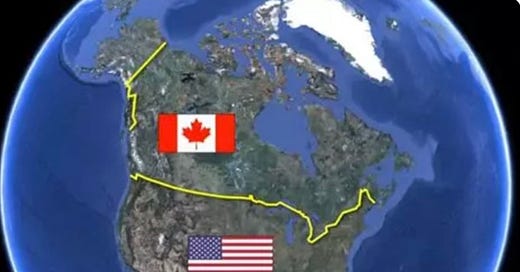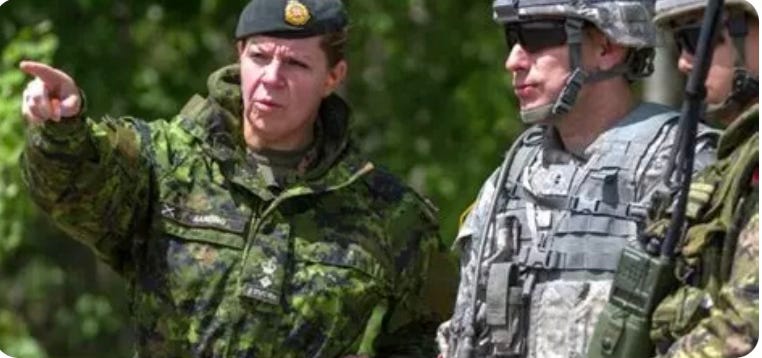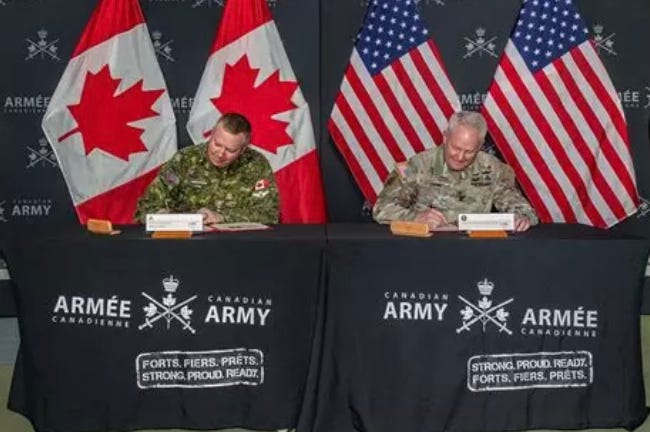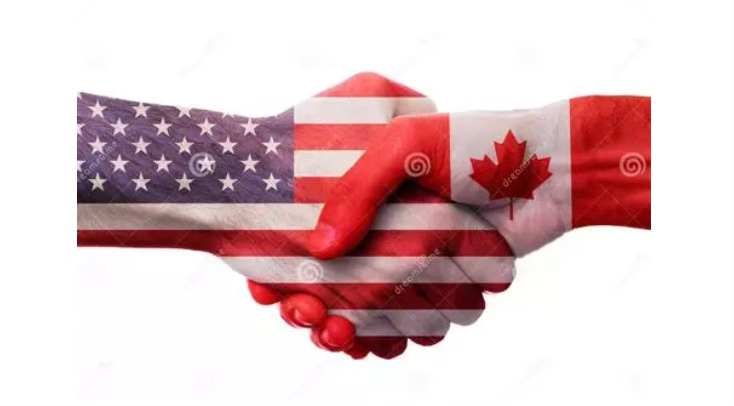Those 5,000 Miles Now Taste Different/Il gusto amaro di 9mila km di confine
Canada Rethinks Its Old Ally Amid Rising Tensions and Uncertainty/Canada, alleanza storica in bilico tra tensioni e incertezze (segue testo in italiano)
Is a new chapter opening in the historic relationship of economic integration and military cooperation between Canada and the USA? Security experts offer contrasting opinions
Audio excerpt with Mark Carney’s statement & transcript:
“The old relationship we had with the United States based on deepening integration of our economies and tight security and military cooperation is over." – Mark Carney, Canadian Prime Minister, March 27, 2025
The scope of Carney's statement, if examined carefully, is exceptional to say the least – in particular, the second part, which refers to military and security cooperation. It is worth recalling the level of integration between the two countries when it comes to the military and arms production. The following arrangements, among others, are currently in force:
· Norad (North American Aerospace Defence Command)
Founded in 1958, NORAD is a joint US-Canadian command that provides aerospace warning, maritime surveillance and defence for North America. The agreement allows the armed forces of both countries to monitor airspace and jointly respond to threats, including missile attacks and aerial intrusions. The NORAD agreement was renewed in 2006 and now also includes the monitoring of maritime activities.
· Shiprider Program (Integrated Cross-Border Maritime Law Enforcement Operations - ICMLEO)
The program enables law enforcement agencies from the United States and Canada to operate jointly in border waters, to combat activities such as drug trafficking, smuggling and illegal immigration. Mixed teams, made up of officers from both countries, can freely cross the maritime border during operations.
· Defence Production Sharing Agreement (DPSA)
Signed in 1956, this agreement facilitates the industrial and technological cooperation in the defence sector between the two countries. The DPSA allows Canadian industries to participate in US Department of Defence contracts, fostering standardization and integration of military production between the two nations. This agreement has led to Canada becoming an important supplier of advanced components and technologies for the US military
Conflicting opinions on complex issues
So, what does Carney mean? That all this is destined to be revised? Or is it a rhetorical exaggeration, dictated by the need to hit back blow for blow at utterances, tariffs and threats coming from the White House, especially given that the election campaign to renew the Canadian parliament is underway?
As always, the truth is probably somewhere in the middle. Canada cannot question, let alone disavow, at least 80 years of cooperation with the USA in the military and security fields. Several reasons make this inadvisable, not least of all a 9000-kms border currently largely undefended, precisely because of these agreements. But the feeling is indeed that there will never be “business as usual” in this context, not even if a less hostile US administration were to take over in the future.
That the possible point of equilibrium could encompass both ideally opposing options is exemplified by the conversation held on “The Current,” a CBC Radio 1 current affairs program, between Jody Thomas, former National Security & Intelligence Advisor to former Prime Minister Justin Trudeau, and Mark Norman, retired Vice Admiral and current Fellow at the Canadian Global Affairs Institute. In the debate, Thomas—also a member of the Council for US/Canada Relations—offers a more measured, one might say "diplomatic," perspective on the ongoing tensions, attributing them primarily to the figure and actions of the current President. In other words, Thomas is careful not to close the door to dialogue with other key players within the vast mosaic of the U.S. government, particularly within the military and intelligence apparatus.
Audio excerpt of interview with Jody Thomas:
Transcript:
Interviewer: Do you believe that The United States are a reliable ally, in 2025?
JT: I believe that the military to military relationship is solid, I believe that the relationship between the security agencies is solid, I think that there is certainly an irrational and mercurial president… and we cannot be dependent on what he says day to day for the defence of Canada.
Mark Norman, on the other hand, takes a less political and conciliatory approach, essentially favoring a “Security First” stance. He points out that the current misalignment is in fact systemic (see the first transcript) and goes so far as to suggest (provocatively, but only to a certain extent) that Canada should consider invoking Article 4 of the NATO treaty (see the second transcript).
Audio excerpt of interview with Mark Norman No. 1
Transcript:
Interviewer: You wrote something in the National Post in February, saying that when the leader of our closest neighbour, ally and trading partner says he can destroy us “with a stroke of a pen” is a real threat and to dismiss it as anything less than that would be irresponsible and naïve. Surely this has something to do with Donald Trump and our relationship such as it is, and such as it was, with the United States.
MN: Oh absolutely. But… [to] Jody’s point, we can’t hang it all on him. Because there is a much deeper set of issues playing out here. There’s an entire shift in the political landscape in the United States and there are a whole bunch of people around the president and this current administration who are of a similar mindset. We can’t just blame this on one guy. There are deeper, systemic and structural issues here, that have created the problems we are dealing with in Canada but equally in the Unites States; they are not going to go away even if that individual was to go away.
Audio excerpt of interview with Mark Norman No. 2
Transcript:
Interviewer: Mark Norman, you floated on social media the idea that Canada should consider its rights to protection under the NATO charter, specifically Article 4, that we should formally approach our allies for support, diplomatic or otherwise, as we are threatened by the United States. What are you getting at there?
MN: Well, I was being intentionally provocative, and this was in the early days of the rhetoric that Jody has described. What I was saying is that NATO has some very clear rules and expectations of conduct among its member nations. Article 4 basically says that if a country feels threatened, it has the right to bring its concerns to the North Atlantic Council and discuss them. That’s a pretty serious and provocative gesture, but my point was that rather than just rolling over and continuing to manage these issues on a tactical, case-by-case basis, we need to take a more strategic approach. We shouldn’t rule out the fact that if this get ridiculous, we do have those rights of protection. I will add that I suspect some folks in Copenhagen are probably having similar considerations, not because of my tweet, but because of the essence of what it means to be part of a multilateral organization.
A fictional future?
So we have different experts holding varying points of view, which is to be expected in any complex issue involving economic, military, social, and cultural dynamics. Each perspective carries its own legitimacy. What is truly astonishing—and something we have yet to fully grasp—is that such a conversation is even taking place. Just a few months ago, the scenario being discussed would have seemed more like the plot of a sequel to Margaret Atwood's distopic novel The Handmaid's Tale, in which the United States, having become a totalitarian theocracy, is in open conflict with democratic Canada.
A scene from the Tv series “A Handmaid’s Tale” based on Margaret Atwood’s distopic novel.
Il gusto amaro di 9mila km di confine
Si sta aprendo un nuovo capitolo nella storica relazione di integrazione economica e cooperazione militare tra Canada e Usa? Gli esperti in materia di sicurezza offrono opinioni contrastanti
Estratto audio con dichiarazione di Mark Carney e trascrizione:
"La vecchia relazione che avevamo con gli Stati Uniti, basata su un'integrazione sempre più profonda delle nostre economie e su una stretta cooperazione in materia di sicurezza e difesa, è finita." – Mark Carney, Primo ministro del Canada, 27 March 2025
La portata della frase di Carney, se esaminata attentamente, è a dir poco eccezionale. Soprattutto se ci si concentra sulla seconda parte, quella riguardante la cooperazione in ambito militare e di sicurezza. Vale la pena ricordare quale sia il livello di integrazione fra i due paesi sia nel campo sia militare che nella produzione di armamenti. In questo momento sono vigenti, fra gli altri, i seguenti accordi:
· NORAD (North American Aerospace Defence Command)
Fondato nel 1958, NORAD è un comando congiunto Usa-Canada che fornisce allerta aerospaziale, sorveglianza marittima e difesa per il Nord America. L’accordo consente alle forze armate di entrambi i paesi di monitorare lo spazio aereo e rispondere congiuntamente alle minacce, inclusi attacchi missilistici e intrusioni aeree. L'accordo NORAD è stato rinnovato nel 2006 e ora include anche il monitoraggio delle attività marittime.
· Shiprider Program (Integrated Cross-Border Maritime Law Enforcement Operations - ICMLEO)
Questo programma consente alle forze dell’ordine di Stati Uniti e Canada di operare congiuntamente nelle acque di confine, contrastando attività come il traffico di droga, il contrabbando e l'immigrazione clandestina. Le squadre miste, composte da ufficiali di entrambi i paesi, possono attraversare liberamente il confine marittimo durante le operazioni.
· Defence Production Sharing Agreement (DPSA)
Firmato nel 1956, questo accordo facilita la cooperazione industriale e tecnologica nel settore della difesa tra i due paesi. Il DPSA consente alle industrie canadesi di partecipare a contratti del Dipartimento della Difesa degli Stati Uniti, promuovendo la standardizzazione e l’integrazione della produzione militare tra le due nazioni. Questo accordo ha reso il Canada un importante fornitore di componenti e tecnologie avanzate per l’esercito statunitense.
Opinioni contrastanti su questioni complesse
Che cosa vuol dire quindi Carney? Che tutto questo è destinato a essere rivisto? O è un’esagerazione retorica, dettata dalla necessità di ribattere colpo su colpo a esternazioni, dazi e minacce provenienti dalla Casa Bianca, soprattutto considerando che in Canada è in corso la campagna elettorale per rinnovare il Parlamento federale?
Come sempre, la verità sta forse nel mezzo. Il Canada non può rimettere in discussione, fino magari a rinnegare, almeno 80 anni di cooperazione con gli USA nel campo militare e della sicurezza. A sconsigliarlo sono vari motivi di opportunità, non da ultimo un confine di 9000 chilometri ad oggi ampiamente non presidiato, proprio in virtù di quegli accordi. Ma la sensazione è che davvero non sarà mai più “business as usual” in questo contesto, nemmeno se in futuro dovesse subentrare un’amministrazione Usa meno ostile.
Che il possibile punto di caduta possa contemplare entrambe le opzioni – idealmente contrapposte – lo dimostra la conversazione tenutasi su “The Current,” programma d’approfondimento di CBC Radio 1, fra Jody Thomas, ex National Security & Intelligence Advisor dell’ex Primo ministro Justin Trudeau, e Mark Norman, Viceammiraglio in pensione e attuale Fellow of the Canadian Global Affairs Institute. Nel dibattito, Jody Thomas, anche per la sua veste di Membro del Council for US/Canada Relations, tende a offrire una prospettiva più contenuta – si potrebbe dire ‘diplomatica’ – delle tensioni in corso, ascrivendole soprattutto alla figura e ai comportamenti dell’attuale Presidente. In altre parole, Thomas sta attenta a non precludersi il dialogo con altre componenti di quel grande mosaico che è il governo americano, facendo in particolare riferimento agli apparati militari e d’intelligence.
Estratto audio dell'intervista con Jody Thomas:
Intervistatore: Lei crede che gli Stati Uniti siano un alleato affidabile, nel 2025?
JT: Credo che il rapporto tra militari sia solido, credo che il rapporto tra le agenzie di sicurezza sia solido, penso che ci sia sicuramente un presidente irrazionale e volubile... e la difesa del Canada non può essere condizionata da ciò che questo signore dice da un giorno all’altro.
Mark Norman, invece, con un’impostazione meno politica e conciliatrice e in essenza orientata al ‘Security First’, ricorda come il disallineamento in atto sia al contrario sistemico (si veda la prima trascrizione) e arriva a suggerire (provocatoriamente ma fino ad un certo punto) che il Canada dovrebbe considerare di invocare l’art 4 del trattato NATO (si veda la seconda trascrizione).
Estratto audio dell'intervista con Mark Norman No. 1
Trascrizione:
Intervistatore: A febbraio lei ha scritto sul National Post che quando il leader del nostro più stretto vicino, alleato e partner commerciale afferma di poterci distruggere “con un colpo di penna” questo rappresenta una vera minaccia e minimizzare la cosa sarebbe da irresponsabili e ingenui. Di sicuro nei nostri rapporti con gli Stati Uniti, così come sono ora e come lo erano in passato, c'entra qualcosa Donald Trump.
MN: Assolutamente sì. Ma... tornando al ragionamento di Jody, non possiamo dare tutta la colpa a lui. Perché qui si stanno palesando una serie di problemi molto più profondi. Si è verificato un intero cambiamento nel panorama politico degli Stati Uniti e ci sono un sacco di persone intorno al presidente e a questa amministrazione che ragionano in modo simile. Non possiamo dare la colpa a una sola persona. Ci sono questioni più profonde, sistemiche e strutturali che hanno creato i problemi che stiamo affrontando in Canada, ma che riguardano anche gli Stati Uniti; non spariranno anche se quell'individuo dovesse sparire.
Estratto audio dell'intervista con Mark Norman No. 2
Trascrizione:
Intervistatore: Mark Norman, sui social media lei ha avanzato l'idea che il Canada dovrebbe fare appello ai propri diritti di protezione impugnando la Carta della Nato, in particolare l'articolo 4, suggerendo che dovremmo chiedere formalmente ai nostri alleati sostegno, diplomatico o di altro tipo, poiché siamo minacciati dagli Stati Uniti. Che cosa intendeva dire?
MN: Beh, sono stato intenzionalmente provocatorio, e mi stavo riferendo ai primi tempi della retorica che Jody ha descritto. Quello che intendevo dire è che la Nato ha regole e aspettative di comportamento molto chiare per i suoi paesi membri. L'articolo 4 stabilisce sostanzialmente che, se un paese si sente minacciato, ha il diritto di portare le sue preoccupazioni al Consiglio Nord Atlantico e discuterne. Si tratta di un gesto abbastanza significativo e provocatorio, ma il mio intento era quello di sottolineare che, invece di accettare passivamente e continuare a gestire queste questioni in modo tattico, caso per caso, dobbiamo adottare un approccio più strategico. Se le cose dovessero degenerare, non dovremmo dimenticare che abbiamo il diritto di essere protetti. Aggiungo che sospetto che alcuni a Copenaghen stiano probabilmente facendo considerazioni simili, non a causa del mio tweet, ma per l'essenza stessa di ciò che significa far parte di un'organizzazione multilaterale.
Un futuro da fiction?
Punti di vista diversi fra diversi esperti. Normale, si dirà. Ed in effetti, non dovrebbe stupire che, come in ogni questione di estrema complessità in cui s’intrecciano dinamiche economiche, militari, sociali e culturali, emergano prospettive diversificate, tutte con una loro legittimità. Ciò che davvero sorprende – e a cui non ci si è onestamente ancora abituati – è che una simile conversazione abbia motivo di esistere. Fino a qualche mese fa, lo scenario discusso sarebbe sembrato tutt’al più l’ambientazione per un sequel del Racconto dell’ancella, il romanzo distopico della scrittrice canadese Margaret Atwood in cui gli Stati Uniti, divenuti una teocrazia totalitaria, sono in aperto conflitto con il Canada democratico.
Una scena tratta dalla serie Tv “Il racconto dell’ancella” basata sul romanzo distopico di Margaret Atwood.










